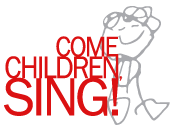Parents are good at “coaching” a toddler in language. “Can you say Thank-You?” usually elicits the desired response and models appropriate expression of gratitude. The same kind of verbal coaching for musical delivery can defeat the very response intended, as musical behavior emerges only in relation to music, not words. Trying to elicit rhythm response with, “Can you say Bah Bah?” reduces rhythm response to words rather than rhythm. If you want to get a musical response from your little MVP, your coaching has to be musical. “Bah bah bah, Bah bah bah?” the usual introduction to Rhythm Dialogue Activities in Duple meter, will evoke a musical response. “Can you do Bah Bahs?” will more likely evoke an imitative verbal response. If coaxing is needed, invite your little one’s rhythm response repeatedly with the musical phrase rather than resorting to words. A verbal request stimulates a verbal response. It is rhythm that activates rhythm knowing, which, in turn, stimulates rhythmic response. Similarly, a tonal phrase, rather than words or a single pitch, stimulates a tonal response. Musical response requires musical context. Songs with words might stimulate singing, but words draw attention to words more than to the musical context.
|

